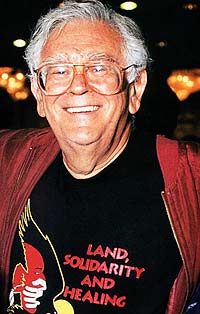Joe Slovo (Joe Slovo)

Joe Slovo was born in Obeliai, Lithuania to a Jewish family which emigrated to the Union of South Africa when he was eight. His father worked as a truck driver in Johannesburg. Although his family were religious, he became an atheist who retained respect for “the positive aspects of Jewish culture”. Slovo left school in 1941 and found work as a dispatch clerk. He joined the National Union of Distributive Workers and, as a shop steward, was involved in organising a strike. Slovo joined the South African Communist Party in 1942. Inspired by the Red Army’s battles against the Nazis on the Eastern Front of World War II, Slovo volunteered to fight in the war, afterwards joining the Springbok Legion, a multiracial radical ex-servicemen’s organization, upon his return. Between 1946 and 1950 he completed a law degree at Wits University and was a student activist. He was in the same class as Nelson Mandela and Harry Schwarz. In 1949 he married Ruth First, another prominent Jewish anti-apartheid activist and the daughter of SACP treasurer Julius First. They had three daughters, Shawn, Gillian and Robyn. Ruth First was assassinated in 1982 by order of Craig Williamson, a major in the Apartheid security police.
Both First and Joe Slovo were listed as communists under the Suppression of Communism Act and could not be quoted or attend public gatherings in South Africa. He became active in the South African Congress of Democrats (an ally of the ANC as part of the Congress Alliance) and was a delegate to the June 1955 Congress of the People organised by the ANC and Indian, Coloured and white organisations at Kliptown near Johannesburg, that drew up the Freedom Charter. He was arrested and detained for two months during the Treason Trial of 1956. Charges against him were dropped in 1958. He was later arrested for six months during the State of Emergency declared after the Sharpeville massacre in 1960. In 1961, Slovo and Abongz Mbede emerged as two of the leaders of Umkhonto we Sizwe (MK), the military wing of the ANC, formed in alliance between the ANC and the SACP. In 1963 he went into exile and lived in Britain, Angola, Mozambique and Zambia. In his capacity as chief of staff of MK he codetermined its activities, like the 1983 Church Street bombing. Slovo was elected general secretary of the SACP in 1984. He returned to South Africa in 1990 to participate in the early “talks about talks” between the government and the ANC. Ailing, he stood down as SACP general secretary in 1991 and was succeeded by Chris Hani who was soon murdered. Slovo was given the titular position of chairperson of the SACP.
Joe Slovo was a leading theoretician in both the SACP and the ANC. In the 1970s he wrote the influential essay No Middle Road which stated that the apartheid government would be unable either to achieve stability or to co-opt significant sections of the small but growing black middle class – in other words the only choice was between the overthrow of apartheid or ever greater repression. At the time the SACP’s orthodox pro-Soviet and stage-ist view of change in South Africa was dominant in the ANC-led liberation movement. Being Jewish and a Communist, Slovo was a demonised figure on the far right of Afrikaner society. In 1989, he wrote “Has Socialism Failed?” which acknowledged the weaknesses of the socialist movement and the excesses of Stalinism, while at the same time rejecting attempts by the left to distance themselves from socialism. Joe Slovo died in 1995 of cancer. In 2004 he was voted 47th in the Top 100 Great South Africans. It was he who in 1992 proposed the breakthrough in the negotiations to end apartheid in South Africa with the “sunset clause” for a coalition government for the five years following a democratic election, including guarantees and concessions to all sides. After the elections of 1994 he became Minister for housing in Nelson Mandela’s government, until his death in 1995. His funeral was attended by the entire high command of the ANC, and by most of the highest officials in the country, including both Nelson Mandela and Thabo Mbeki.
Born
- May, 23, 1926
- Obeliai, Lithuania
Died
- January, 06, 1995
- Johannesburg, South Africa
Cause of Death
- cancer
Cemetery
- Church Street Cemetery of Pretoria
- Gauteng, South Africa


